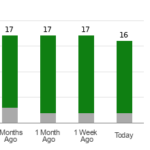
Colorado, once a formidable force in recreational marijuana sales, has seen its market take a hit. In 2023, the state’s cannabis sales barely eked past the $1.5 billion mark, a decrease from $1.7 billion in 2022 and a significant drop from the peak of over $2 billion annually in 2020 and 2021.
This downtrend marks the lowest sales year for Colorado since 2017, with December sales totaling $115.8 million, leading to a year-long total of $1.52 billion.
In spite of this, Colorado has reached a milestone of $15.5 billion in total sales since the market’s inception in January 2014. The decline is attributed to the end of the pandemic boom and the emergence of competitive markets in nearby states such as New Mexico, which reported $555.8 million in cannabis goods in 2023.
The state’s market, boasting over 1,100 stores, signals a shift towards consolidation, exemplified by Schwazze (SHWZ) previously targeting 100 stores. Despite ongoing price deflation, there’s a slight stabilization in retail and wholesale prices. The market is fragmented, with leading chains by PharmaCann and Schwazze.
Michigan’s Market Struggles Amid Expansion
In Michigan, the cannabis industry, despite a record December, saw a 13.5% sales drop in January, with total sales amounting to $242.8 million. The decrease reflects a broader trend of slowing growth, with the lowest year-over-year increase since March 2022.
However, adult-use sales continue to grow, compensating for a steep decline in medical sales. The state’s market witnessed significant growth, reaching $3.06 billion in 2023, a 33.3% increase from the previous year. The expansion of supply and distribution networks is anticipated to further bolster the market.
The market, with 751 recreational and 245 medical stores, faces tough economics despite being one of the fastest-growing.
Public MSOs like Red White & Bloom Brands Inc. (RWBYF), TerrAscend (TRSSF), 4Front (FFNTF), Ascend Wellness Holdings (AAWH), Cresco (CRLBF), and Verano (VRNOF) are pivotal players in this fragmented market.
Virginia’s Progress Towards Legal Market
The Virginia House of Delegates has taken a decisive step by passing HB698, with the aim of establishing a retail marketplace for recreational marijuana. This move follows the 2021 voter approval to end the prohibition on recreational marijuana, with expectations for retail sales to commence by January 1, 2024.
The bill’s passage, by a narrow vote of 52-48, signifies a significant political shift, especially following the recent Democratic control over both houses of the General Assembly. This development is a critical step towards realizing the state’s retail cannabis market, which has faced delays since the 2021 voter mandate.
Companies such as The Cannabist Company Holdings Inc. (CBSTF), Green Thumb Industries Inc. (GTBIF), and Jushi Holdings Inc. (JUSHF) are poised to lead Virginia’s recreational cannabis market by July 1, 2024, as analyzed by Pablo Zuanic from Zuanic & Associates. These firms are expected to leverage their early entry, limited competition, and the state’s market potential to establish a significant presence, giving them a strategic advantage in Virginia’s budding cannabis industry.





